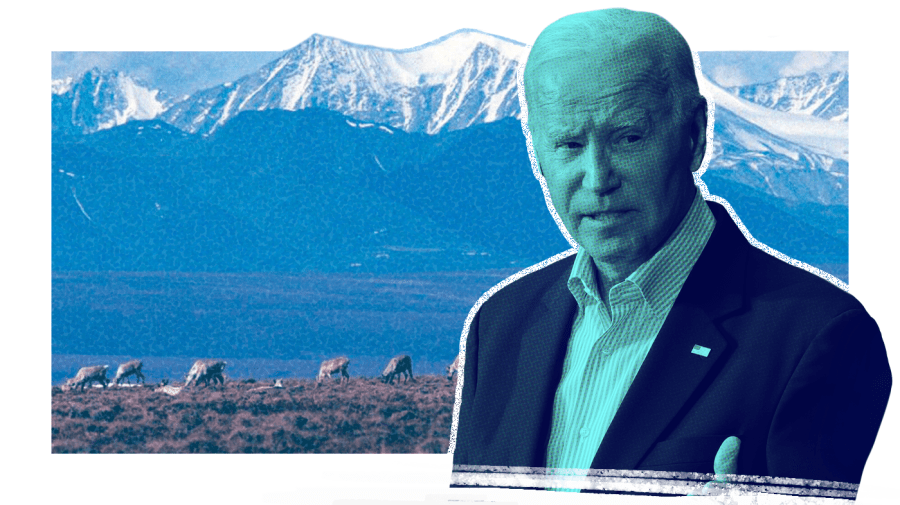Why Trump’s tax law could limit Biden’s efforts to protect Arctic wildlife from drilling

- Oops!Something went wrong.Please try again later.
The Biden administration’s efforts to protect wildlife in the Arctic from oil and gas drilling is on a collision course with a Trump-era law requiring oil and gas leasing there.
When President Biden was on the campaign trail he called for “permanently protecting” the Arctic National Wildlife Refuge from drilling. And this past week, his administration canceled oil and gas rights issued there under the Trump administration.
The president, in a written statement, said the action “will help preserve our Arctic lands and wildlife, while honoring the culture, history, and enduring wisdom of Alaska Natives.”
But a 2017 tax law also required at least one drilling rights sale to be held by the end of 2021, and another to be held by the end of next year — meaning the Biden administration is expected to have to auction off some land in the refuge for oil and gas development.
The latest action is also expected to face a court challenge, with Alaska’s governor indicating he will sue the Biden administration.
“We will fight for Alaska’s right to develop its own resources and will be turning to the courts to correct the Biden Administration’s wrong,” Republican Gov. Mike Dunleavy said in a written statement this week.
The Arctic National Wildlife Refuge, sometimes abbreviated as ANWR, is an area of northeastern Alaska along the border with Canada’s Yukon that is about the same size as North Carolina.
It is on the traditional homeland of the Iñupiat and Gwichʼin peoples and also contains a great deal of wildlife, including black, brown and polar bears; caribou, wolves and wolverines; and more than 200 species of birds.
Whether to allow oil and gas production in the refuge has been a political issue for decades.
On Wednesday, the Interior Department announced it would cancel seven leases in the wildlife preserve that were issued to the Alaska Industrial Development and Export Authority during the Trump administration.
Interior Secretary Deb Haaland said the lease sale, which was held during the final days of the Trump administration, was “seriously flawed and based on a number of fundamental legal deficiencies.”
“With today’s action, no one will have rights to drill for oil in one of the most sensitive landscapes on Earth,” she told reporters.
However, a document released alongside the decision indicates that the administration, bound by the 2017 law, will still lease land for drilling in the area — even if it successfully fends off the legal challenge to its latest move from Alaska’s government.
The document says the Bureau of Land Management will have to decide “which tracts of land to offer for lease” as well as what conditions to put on those leases.
Mark Squillace, a professor at the University of Colorado Law School, said the Biden administration’s move presents “some risk from a litigation perspective.”
“I think there is a violation of the obligation to do a couple of leases there,” he said, but he added that they didn’t necessarily have to be the same leases issued by the Trump administration. He also said he doesn’t know if there’s “any significant remedy” that a court could issue.
In a written statement shared with The Hill, Alaska Attorney General Treg Taylor declined to share details of the state’s legal strategy but reaffirmed that the state would challenge the decision.
“We are very disappointed by President Biden’s decision, reneging on the leases contrary to federal law. We are still reviewing the documents and do not want to speculate on what any challenge might ultimately look like. But be assured that we will be fighting back,” Taylor said.
Christophe Courchesne, director of the Environmental Advocacy Clinic and an assistant professor of law at the Vermont Law and Graduate School, said that if the state of Alaska prevails in its legal challenge, the seven leases could be reinstated.
However, Courchesne also said he believes the administration was within its rights to cancel the leases.
“I think a cancellation under the secretary’s authority to cancel and modify leases to comply with federal law seems well-grounded to me,” he said.
Meanwhile, Squillace noted that while the 2017 law may constrain the Biden administration’s ability to protect the land, the leases may not actually ever amount to any actual oil extraction in the refuge.
“I think that if that were to happen, there’s going to be a lot of political opposition, and there’s going to be probably a lot of litigation to try to force Interior to put significant constraints on … drilling,” he added. “And meanwhile, we’re gonna be seeing a surge in electrification of transportation and the grid in ways that are going to minimize the demand for the oil and gas that would be produced there.”
For the latest news, weather, sports, and streaming video, head to The Hill.

